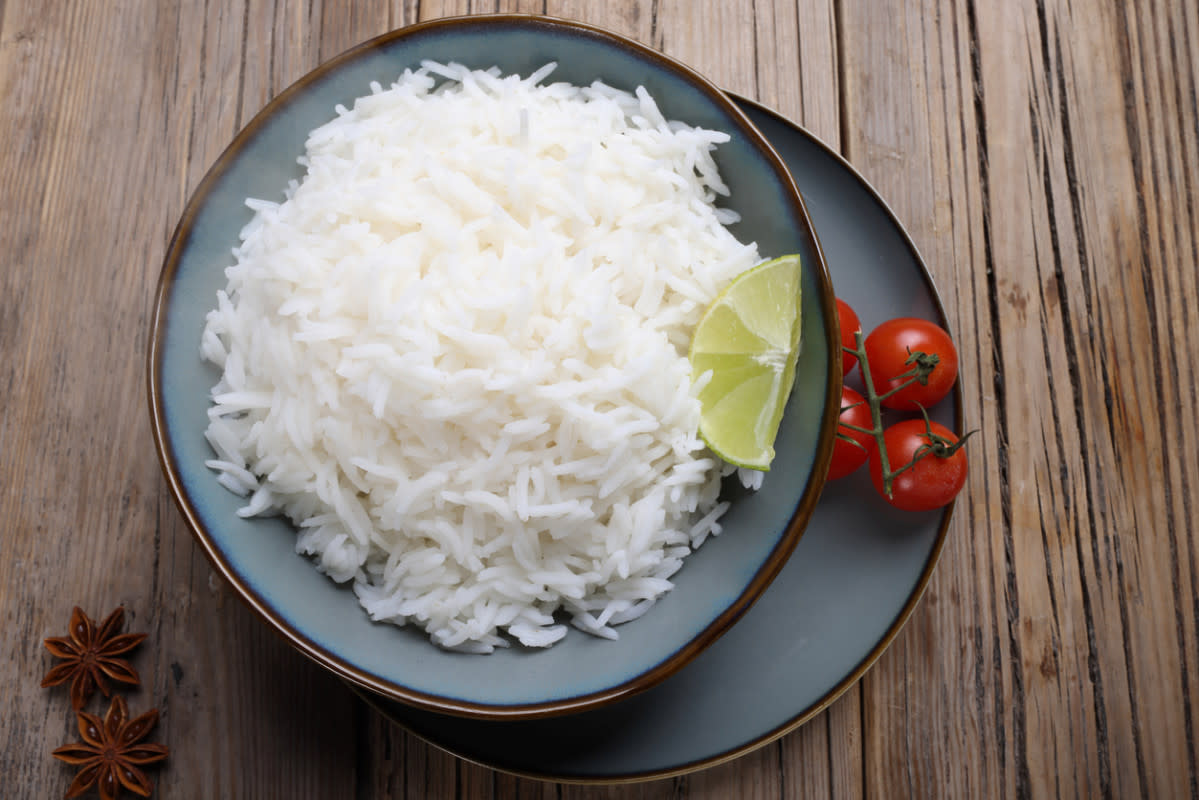What Happens to Your Body if You Eat Rice Every Day

Bowl of rice
Rice is the most commonly eaten food in the world, grown in more than 100 countries. It’s easy to see why most people have a bag or box of rice in their pantry at all times: it’s inexpensive, doesn’t spoil quickly, and is super versatile. No matter what protein or veggies you have on hand, rice can be incorporated into your meal.
But is it healthy to eat rice every single day? If you’re a rice lover, it may be a question on your mind. Perhaps you’re wondering if eating rice every day will affect your weight, impact your energy levels, or raise or lower your risk for cardiovascular disease. Maybe you’re wondering if you should be choosing brown rice over white rice since you already eat it regularly.
Here, registered dietitians answer all these questions and more. Curious about how white rice compares to brown rice and how eating either one every day can impact your body? Keep reading to find out.
Related: This Dietitian-Approved Grocery List Will Ensure You're Stocked With Healthy, Delicious, and Versatile Foods
Is Rice Healthy?
Similar to potatoes, there’s a lot of confusion about whether or not rice is actually healthy. Delish Knowledge registered dietitian Alex Caspero, RD, wants everyone to know that rice is, in fact, a healthy food—and that goes for all varieties of it. “Both white rice and brown rice are considered healthy, and you may be surprised that there isn't much difference between them,” she says.
Registered dietitian Alexis Newman, RD, agrees, saying that rice provides carbohydrates, which is the body’s preferred source of energy. She explains that the difference between white rice and brown rice is that white rice has gone through the process of removing the bran, hull and husk, resulting in it being a simple carbohydrate. Brown rice is a complex carbohydrate as it has not been through this same process.
Both dietitians say that brown rice is more nutrient-dense than white rice, but the differences are pretty minor. Caspero says that brown rice has slightly more fiber and protein than white rice. Since the differences are so slight, she recommends going for the one you like the taste for best.
Related: 6 Carbs Dietitians Want People to Eat More of (Yes, Really!)
How Eating Rice Every Day Impacts the Body
Rice may be healthy, but is it okay to eat it every single day? Both Newman and Caspero recommend eating a wide variety of foods because that’s the best way to get all the nutrients the body needs. That said, eating rice every day can be healthy, as long as you are meeting your nutritional needs through other foods.
Caspero does offer up one caveat, saying that it’s important to be aware of the arsenic content in rice, which is more of a concern for infants, children, pregnant women and older adults. However, she says that the amount of arsenic in rice can be reduced by washing it before cooking. Caspero also says that white rice has less arsenic than brown rice due to the way it's milled to remove the outer hull.
Many people may wonder if eating rice every day will cause them to gain weight. Caspero says this has less to do with the rice itself and more to do with the overall calories that someone is consuming. “No food will cause weight gain unless a caloric excess is achieved. Or, to put it more plainly, if you eat more than your body needs, then you will gain weight,” she explains.
Related: Looking to Lose Weight? Get Started With These 40 Expert and Science-Backed Foods and Drinks
Something you can expect from eating rice every day is to have more energy. Newman explains that since white rice is a simple carbohydrate, it can lead to a quicker surge of energy than brown rice, which is a complex carbohydrate and lower on the glycemic index. If you want to avoid an energy crash, she recommends eating brown rice, which gives more sustainable energy and doesn’t cause blood sugar levels to spike and then drop the way white rice can.
Newman says that eating rice every day can also support healthy digestion. She says that brown rice in particular can help with constipation since it’s a bit higher in fiber than white rice. “The higher fiber content can also help with feeling fuller for a longer period of time,” she adds.
If you eat brown rice every day, Caspero says that it could impact your heart—in a good way! “Brown rice is considered to be a whole grain, and research is consistent in showing an association between a diet rich in whole grains and reduced risk of heart disease, diabetes and some cancers,” she adds.
As you can see, it’s perfectly healthy to eat rice every day, which is exactly what happens in many countries around the world. Both dietitians reiterate that what’s most important is to keep on top of all your nutrient needs by incorporating a wide variety of other foods into your diet; rice can’t do it all! But if you’re a rice lover, consider your go-to grain officially RD-approved.
Next up, here are 20 easy rice recipes to try.
Sources
Alex Caspero, RD, registered dietitian at Delish Knowledge
Alexis Newman, RD, registered dietitian
